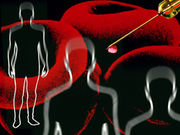Findings in young adults with Philadelphia chromosome-negative acute lymphoblastic leukemia
MONDAY, Sept. 19, 2016 (HealthDay News) — For young adults with acute lymphoblastic leukemia (ALL), adding rituximab to chemotherapy is associated with increased event-free survival, according to a study published in the Sept. 15 issue of the New England Journal of Medicine.
Sébastien Maury, M.D., Ph.D., from the Hôpital Henri Mondor in Paris, and colleagues randomized 209 adults aged 18 to 59 years with CD20-positive, Philadelphia chromosome (Ph)-negative ALL to chemotherapy with (105 patients) or without rituximab (104 patients). Rituximab was given during all treatment phases (16 to 18 infusions).
The researchers found that event-free survival was longer in the rituximab group than the control group (hazard ratio, 0.66; P = 0.04) after a median follow-up of 30 months, with estimated two-year event-free survival rates of 65 and 52 percent, respectively. In multivariate analysis, treatment with rituximab remained associated with longer event-free survival. There was no significant between-group difference noted in the overall incidence rate of severe adverse events; the rituximab group had fewer allergic reactions to asparaginase.
“Adding rituximab to the ALL chemotherapy protocol improved the outcome for younger adults with CD20-positive, Ph-negative ALL,” the authors write.
Several authors disclosed financial ties to biopharmaceutical companies, including Genentech, the manufacturer of rituximab.
Full Text (subscription or payment may be required)
Copyright © 2016 HealthDay. All rights reserved.








